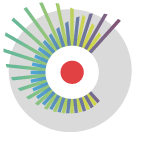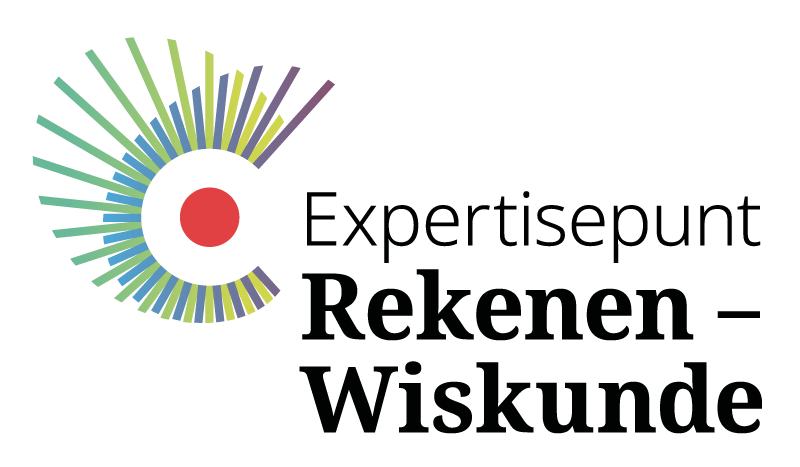
Tussen september 2023 en de zomer van 2024 heeft het Expertisepunt rekenen-wiskunde een literatuurstudie uitgevoerd. Lees hier de belangrijkste bevindingen (Onderaan de download van het rapport):
- In de huidige onderzoeksliteratuur wordt weinig aandacht besteed aan de traditionele basisoperaties, zoals het automatiseren van de bewerkingen optellen, aftrekken, vermenigvuldigen en delen. Dit zijn de zogeheten “basisoperaties” of de procedural fluency in het model reken-wiskundige vaardigheid, het touw met vijf strengen. Dit model benadrukt ook dat het verbinden van procedurele kennis en conceptuele kennis versterkend werkt voor de vaardigheid als geheel.
- Daarentegen is er in de literatuur en in internationale beleidsdocumenten juist veel aandacht voor vaardigheden van een hoger niveau, zoals probleemoplossend denken en het gebruik van modellen. In veel landen zijn deze vaardigheden ook in de curricula opgenomen.
- Daarnaast is er, mede onder invloed van PISA, veel aandacht voor gecijferdheid of mathematical literacy. Dit wordt beschouwd als het centrale doel van wiskundeonderwijs. Basisvaardigheden zijn in deze optiek de gecijferdheids-competenties die men nodig heeft om in samenleving en beroep te kunnen functioneren.
Samengevat
In het begrip basisvaardigheden komen verschillende vaardigheden samen, met als belangrijkste doel het functioneren in maatschappij en beroep te ondersteunen.
Beleidsaanbevelingen
- Beperk de interpretatie van basisvaardigheden rekenen-wiskunde niet tot procedurele vaardigheden, maar stel de ontwikkeling van gecijferdheid centraal in het beleid.
Basisvaardigheden rekenen-wiskunde vormen een breed pallet van kennis, vaardigheden en inzichten dat meer behelst dan procedurele vlotheid. De concept-kerndoelen en examenprogramma’s bieden overigens al aanknopingspunten voor deze interpretatie. - Verbind basisvaardigheden rekenen-wiskunde met andere basisvaardigheden.
Gecijferdheid richt zich op het functioneren in een maatschappij waarin technologie een steeds grotere rol speelt. Daarom is werken aan gecijferdheid ook werken aan andere basisvaardigheden zoals burgerschap en digitale geletterdheid. Ook binnen andere schoolvakken liggen er mogelijkheden om gecijferdheid als basisvaardigheid rekenen-wiskunde een plaats te geven. - Borg de onderwijstijd voor basisvaardigheden rekenen-wiskunde
Gelet op het belang van basisvaardigheden rekenen-wiskunde, dat zich dus ook uitstrekt tot burgerschap en digitale geletterdheid, is het belangrijk om de onderwijstijd voor rekenen-wiskunde te borgen. Onvoldoende onderwijstijd leidt tot onderwijs waarin leerlingen onvoldoende gecijferd worden. - Overweeg meer gedetailleerde invulling van curricula per jaarlaag
Om te garanderen dat de basisvaardigheden en de gecijferdheid als leerdoelen voldoende aandacht krijgen, verdient het aanbeveling om behalve examenprogramma’s ook curricula per leerjaar te ontwikkelen, zodat docenten, toetsontwikkelaars en methodeauteurs meer informatie hebben over de beoogde curricula.
Het hele rapport ‘Blik op de basis. Een literatuurstudie naar basisvaardigheden rekenen-wiskunde’: Download (pdf).
Verwijzingen
- (2022). Bildungsstandards für das Fach Mathematik Erster Schulabschluss (ESA) und Mittlerer Schulabschluss (MSA) (PDF): Sekretariat der Ständigen Konferenz der Kultusminister der Länder in der Bundesrepublik Deutschland (SSKKLBD).
- Bahr, D. L. (2007). Creating Mathematics Performance Assessments that Address Multiple Student Levels (PDF) Australian Mathematics Teacher, 63(1), 33-40.
- Baroody, A. J., Feil, Y. and Johnson, A. R. (2007). An Alternative Reconceptualization of Procedural and Conceptual Knowledge (PDF) Journal for Research in Mathematics Education, 38(2), 115-131.
- Blagdanic, C. and Chinnappan, M. (2013). Supporting Students to Make Judgements Using Real-Life Data (PDF) Australian Mathematics Teacher, 69(2), 4-11.
- Bolstad, O. H. (2023). Lower secondary students’ encounters with mathematical literacy (PDF) Mathematics Education Research Journal, 35(1), 237-253 doi:10.1007/s13394-021-00386-7.
- Brahier, D. J. (2001). Understanding Mathematics and Basic Skills (PDF) Mathematics Teaching in the Middle School, 7(1), 8-9.
- Brendefur, J. L., Strother, S., Rich, K. and Appleton, S. (2016). Assessing Student Understanding: A Framework or Testing and Teaching (PDF) Teaching Children Mathematics, 23(3), 174-181.
- Cantley, I. (2019). PISA and policy-borrowing: A philosophical perspective on their interplay in mathematics education (PDF) Educational Philosophy and Theory, 51(12), 1200-1215 doi:10.1080/00131857.2018.1523005.
- Castro, A., Prat, M. and Gorgorió, N. (2016). Conceptual and procedural knowledge in mathematics: their development after decades of research Revista de Education(374), 42-66 doi:10.4438/1988-592X-RE-2016-374-325.
- Coffey, P. and Sharpe, R. (2023). An investigation into the teaching of numeracy in subjects other than mathematics across the curriculum (PDF) International Journal of Mathematical Education in Science and Technology, 54(5), 860-887 doi:10.1080/0020739X.2021.1978570.
- Correa, P. D. and Haslam, D. (2020). Mathematical Proficiency as the Basis for Assessment: A Literature Review and Its Potentialities (PDF) Mathematics Teaching Research Journal, 12(4), 3-20.
- Davis, J. (2013). Student Understandings of Numeracy Problems: Semantic Alignment and Analogical Reasoning (PDF) Australian Mathematics Teacher, 69(2), 19-26.
- Davis, J. D. (2005). Connecting Procedural and Conceptual Knowledge of Functions Mathematics Teacher, 99(1), 36-39.
- Denmark, T. and Kepner, H. S., Jr. (1980). Basic Skills in Mathematics: A Survey Journal for Research in Mathematics Education, 11(2), 104-23 doi:https://doi.org/10.2307/748903.
- Engel, J. (2017). Statistical Literacy for Active Citizenship: A Call for Data Science Education (PDF) Statistics Education Research Journal, 16(1), 44-49.
- Frejd, P. and Geiger, V. (2017). Exploring the Notion of Mathematical Literacy in Curricula Documents (PDF). In International Perspectives on the Teaching and Learning of Mathematical Modelling (pp. 255-263): Springer Science and Business Media B.V.
- Gal, I. (2023). Critical Understanding of Civic Statistics: Engaging with Important Contexts, Texts, and Opinion Questions (PDF). In Statistics for Empowerment and Social Engagement: Teaching Civic Statistics to Develop Informed Citizens (pp. 323-343): Springer International Publishing.
- Geiger, V., Gal, I. and Graven, M. (2023). The connections between citizenship education and mathematics education (PDF) ZDM – Mathematics Education, 55(5), 923-940 doi:10.1007/s11858-023-01521-3.
- Geiger, V., Goos, M. and Forgasz, H. (2015). A rich interpretation of numeracy for the 21st century: a survey of the state of the field (PDF) ZDM – Mathematics Education, 47(4), 531-548 doi:10.1007/s11858-015-0708-1.
- Geiger, V., Goos, M. and Forgasz, H. (2015). A rich interpretation of numeracy for the 21st century: a survey of the state of the field (PDF) ZDM – Mathematics Education, 47(4), 531-548 doi:10.1007/s11858-015-0708-1.
- Hiebert, J. and Lefevre, P. (1986). Conceptual and procedural knowledge in mathematics: An introductory analysis. In Conceptual and procedural knowledge: The case of mathematics. (pp. 1-27). Hillsdale, NJ, US: Lawrence Erlbaum Associates, Inc.
- Hurrell, D. (2021). Conceptual Knowledge OR Procedural Knowledge or Conceptual Knowledge AND Procedural Knowledge: Why the Conjunction is Important to Teachers (PDF) Australian Journal of Teacher Education, 46(2), 57-71 doi:10.14221/ajte.2021v46n2.4.
- Kieran, C. (2013). The False Dichotomy in Mathematics Education Between Conceptual Understanding and Procedural Skills: An Example from Algebra (PDF). In K. R. Leatham (Ed.), Vital Directions for Mathematics Education Research (pp. 153-171). New York, NY: Springer New York.
- Kilpatrick, J. (2001). Understanding mathematical literacy: The contribution of research (PDF) Educational Studies in Mathematics, 47(1), 101-116 doi:10.1023/A:1017973827514.
- Kilpatrick, J., Swafford, J. and Findell, B. (2001). Adding it Up. Helping Children Learn Mathematics. Washington DC, USA: National Academies Press.
- Kirwan, L. (2015). Mathematics Curriculum in Ireland: The Influence of PISA on the Development of Project Maths (PDF) International Electronic Journal of Elementary Education, 8(2), 317-332.
- Kus, M. (2018). Numeracy (PDF) Brock Education: A Journal of Educational Research and Practice, 27(2), 58-62.
- Kusmaryono, I. and Kusumaningsih, W. (2023). Evaluating the Results of PISA Assessment: Are There Gaps Between the Teaching of Mathematical Literacy at Schools and in PISA Assessment? (PDF) European Journal of Educational Research, 12(3), 1479-1493 doi:10.12973/eu-jer.12.3.1479.
- Marković, O., Pikula, M. and Zubac, M. (2019). A critical analysis of the pisa mathematics tasks (PDF) Croatian Journal of Education, 21(1), 233-274 doi:10.15516/cje.v21i1.3245.
- Meelissen, M., Maassen, N., Gubbels, J., van Langen, A., Valk, J., Dood, C., Derks, I., In ’t Zandt, M. and Wolbers, M. (2023). Resultaten PISA-2022 in vogelvlucht (PDF). Enschede: University of Twente.
- Mumcu, H. Y. (2016). Using Mathematics, Mathematical Applications, Mathematical Modelling, and Mathematical Literacy: A Theoretical Study (PDF) Journal of Education and Practice, 7(36), 80-96.
- Newport, J. F. (1979). Why the Decline in Student Achievement of the Basic Skills? School Science and Mathematics, 79(2), 122-24 doi:https://doi.org/10.1111/j.1949-8594.1979.tb09461.x.
- Niss, M. (2003). Mathematical competencies and the learning of mathematics: The Danish KOM project (PDF).
- Niss, M., Bruder, R., Planas, N., Turner, R. and Villa-Ochoa, J. A. (2016). Survey team on: conceptualisation of the role of competencies, knowing and knowledge in mathematics education research (PDF) ZDM – Mathematics Education, 48(5), 611-632 doi:10.1007/s11858-016-0799-3.
- Niss, M. and Hojgaard, T. (2019). Mathematical Competencies Revisited (PDF) Educational Studies in Mathematics, 102(1), 9-28.
- O’Keeffe, L. and Paige, K. (2021). Re-highlighting the potential of critical numeracy (PDF) Mathematics Education Research Journal, 33(2), 285-299 doi:10.1007/s13394-019-00297-8.
- Osterman, T. and Brating, K. (2019). Dewey and Mathematical Practice: Revisiting the Distinction between Procedural and Conceptual Knowledge (PDF) Journal of Curriculum Studies, 51(4), 457-470.
- Ozmen, Z. M. and Guven, B. (2019). Evaluating Students’ Conceptual and Procedural Understanding of Sampling Distributions (PDF) International Journal of Mathematical Education in Science and Technology, 50(1), 25-45.
- Rittle-Johnson, B. (2019). Iterative development of conceptual and procedural knowledge in mathematics learning and instruction (PDF). In J. Dunlosky and K. Rawson (Eds.), The Cambridge Handbook of Cognition and Education (pp. 124-147): Cambridge University Press.
- Rittle-Johnson, B., Schneider, M. and Star, J. R. (2015). Not a one-way street: Bidirectional relations between procedural and conceptual knowledge of mathematics (PDF) Educational Psychology Review, 27(4), 587–597.
- Rittle-Johnson, B. and Star, J. R. (2009). Compared With What? The Effects of Different Comparisons on Conceptual Knowledge and Procedural Flexibility for Equation Solving (PDF) Journal of Educational Psychology, 101(3), 529-544 doi:10.1037/a0014224.
- Schoenfeld, A. H. (2007). Assessing mathematical proficiency (PDF): Cambridge University Press.
- Sellars, M. (2017). Numeracy in authentic contexts: Making meaning across the curriculum (PDF): Springer Singapore.
- Sikko, S. A. (2023). What Can We Learn from the Different Understandings of Mathematical Literacy? (PDF) Numeracy, 16(1) doi:10.5038/1936-4660.16.1.1410.
- Stacey, K. and Turner, R. (2015). The evolution and key concepts of the PISA mathematics frameworks (PDF). In Assessing Mathematical Literacy: The PISA Experience (pp. 5-33): Springer International Publishing.
- Star, J. R. (2005). Reconceptualizing procedural knowledge Journal for Research in Mathematics Education, 36(5), 404-411.
- Star, J. R. and Stylianides, G. J. (2013). Procedural and Conceptual Knowledge: Exploring the Gap Between Knowledge Type and Knowledge Quality (PDF) Canadian Journal of Science, Mathematics and Technology Education, 13(2), 169-181 doi:10.1080/14926156.2013.784828.
- Zhang, J., Zhou, D., Wang, R. and Song, L. (2021). Core Content Selection and Textbook Design for High School Mathematics (PDF). In School Mathematics Textbooks in China: Comparative Studies and Beyond (pp. 1-42): World Scientific Publishing Co.

